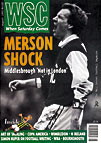 A tournament organised by fans and played by fans, with the proceeds going to charity, should have been an ideal way to spend a day in football's off-season. But Phil Mongredien explains how the FA tried to shut it down
A tournament organised by fans and played by fans, with the proceeds going to charity, should have been an ideal way to spend a day in football's off-season. But Phil Mongredien explains how the FA tried to shut it down
The close season: a good time to have a holiday, catch up on friends not seen since last August, or watch Ceefax for that big-money signing promised by the chairman. A good time, too, one would have thought, for a few light-hearted football matches against fans of rival clubs. Well, no, actually. This is the strange tale of how the FA attempted to prevent the staging of a low-profile charity tournament arranged and contested by fans.
The Euronet football tournament was first held last year to coincide with Euro ’96. Arranged using fan mailing lists on club web-sites on the Internet, supporters from 16 clubs took part in the competition in Nottingham. There was no trouble between rival fans, around £2,000 was raised for Children in Need and, in a progressive move, mixed teams were allowed.
The team representing Middlesbrough took the trophy in what, with hindsight, proved not to be a particularly useful pointer towards the outcome of the season to come. The event was successful enough for plans to be made for a repeat run, but the organizers reckoned without the bureaucracy of the FA.
The 1997 tournament had originally been scheduled to take place on local authority park pitches in Bradford. Roger Goodair, one of Euronet’s organizers, wrote to West Riding FA asking for the forms to book the pitches. But when they realized that teams would be arriving from all over the country, he was told that it was a matter for Lancaster Gate.
When Mr Goodair contacted the FA, their response was swift. Within a week, he received a letter signed on behalf of Graham Kelly, telling him that the FA could not sanction the event. The letter said: “I have to inform you that under our rules and regulations it is not permissible for an 11-a-side competition to be staged on the proposed dates (28 and 29 June). This is within the official close season which runs from 16 June to 15 July inclusive. I would also point out that mixed football is not permitted.”
Any attempts to argue about the relevance of the close season to such a low-key affair were met with the answer that it was “tradition”, and that no team, professional or amateur, could play during the close season period.
To ensure that the event was stopped, the FA contacted Bradford City Council Leisure Services Department telling them that under no circumstances should they allow their pitches to be used at the end of June. If the tournament was to go ahead, it would either have to be brought forward at very short notice, or it would have to be held on pitches over which the FA had no control.
The latter option was chosen and a suitable venue was finally found in Middlesbrough. So, at the end of June, 27 teams of supporters from a wide range of English and Scottish clubs from Celtic to Plymouth, as well as a team representing AEK Athens, descended upon Teesside for a weekend of football.
Thankfully, the professional clubs proved to be more co-operative than the FA, several of them, including Colchester and Middlesbrough, supplying kits for their teams. Boro even went so far as to buy a trophy, although since they were responsible for the loss of the original, which had last been heard of sitting in their trophy cabinet, that does seem only right. In a further gesture of goodwill from Boro, the celebrity guest who kicked proceedings off and gave out prizes was none other than local legend Wilf Mannion. No doubt the FA will be trying to reclaim his 26 England caps upon reading this.
From WSC 126 August 1997. What was happening this month